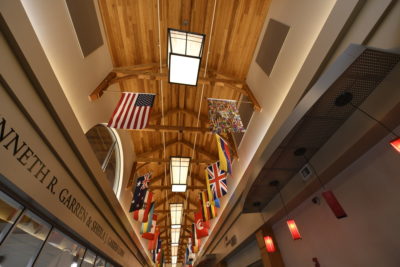 The University of Lynchburg is giving high school students a chance to test their mettle and explore an exciting and fast-growing field among experts at its first-ever Virginia Intelligence Studies Competition.
The University of Lynchburg is giving high school students a chance to test their mettle and explore an exciting and fast-growing field among experts at its first-ever Virginia Intelligence Studies Competition.
The Feb. 25 event will bring small teams of students from area high schools to campus, where they’ll present a pre-prepared proposal in response to a mock international security prompt and background information.
A panel of judges will ask questions and give feedback, then give the teams new information that they’ll use to revise their proposal. The competition will conclude with an awards ceremony and provided lunch.
Dr. David Richards, associate professor of international relations and political science and chair of the political science department, said he wanted to connect students with professional judges who work within the field so the students can get a feel for what it’s like.
“It’s meant to be constructive and empowering so the students get an idea of what to expect,” he said of their feedback to the teams.
The judges are U.S. Navy Lt. Leland Hertig, Jeff Taylor, a senior intelligence analyst with the National Security Agency, and Dr. Karen Walker, a former foreign affairs officer and lecturer at Johns Hopkins University Krieger School of Arts and Sciences, Advanced Academic Programs.
Richards said the event is loosely modeled after the Atlantic Council’s annual Cyber 9/12 Security Challenge, which pits teams of mostly university students against each other to brainstorm security solutions at different sites across the globe. With an eye on eventually getting a challenge team together for the University, he also thought of setting it up as the host for a high school-level competition.
Lynchburg students majoring in intelligence studies will also be helping out as mentors for the participating teams, getting in touch with them in advance to offer preliminary guidance and walking them through the process while on campus. Plus, it’s an opportunity to brush elbows with some experienced and accomplished pros in the field.
“It’ll be a really good opportunity for networking for our students … but also the high school students can talk to people who actually do the work and get a feel for what that’s like,” Richards said.
He said the competition — hopefully set to become an annual one — will serve to introduce people to the field of intelligence studies, dispel myths, and show what kind of opportunities are out there. Lynchburg’s program has grown to around 20 students in the three years it’s been available, and federal data projects job growth in the sector at a whopping 35% over the next 10 years.
Richards said studying intelligence is a good fit for people who like doing research and analysis, who are good with numbers or languages, or who are interested in the nuts and bolts of diplomacy or investigative law enforcement.
Participants will walk away having realized the depth and importance of security and safety as a common issue everyone is facing — not an us-or-them problem — and get a glimpse of what serious security jobs look like, he added.

